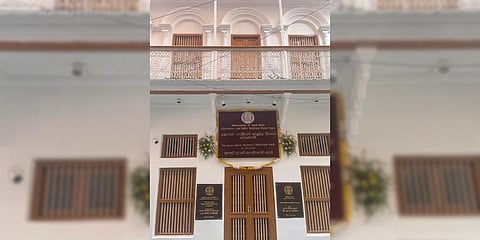

VARANASI: For the 250-odd families living in Hanuman, Kedar and Harishchandra Ghats of Varanasi – known as mini Tamil Nadu in the heart of the holy city – the just-concluded Kashi Tamil Sangamam (KTS) rekindled the ancient connect between Kashi and Kachi.
The bond between this cultural city in Uttar Pradesh and Tamil Nadu is centuries-old, as several mutts and temples – some even having Dravidian architectural designs - have been attracting thousands of Tamil pilgrims not only from India but abroad – mainly to perform the after-life rituals of deceased families conduct for their dear ones.
“The ties between Kashi and Tamil Nadu are centuries-old as it is the abode of Lord Shiva. We are delighted that this first-of-its-kind initiative was taken to revive and further strengthen our connection,” K Venkat Ramana Ghanapati, a Vedic pandit and the first person of Tamil origin, who has been made Trustee at Shri Kashi Vishwanath Temple Trust by the Uttar Pradesh government, told TNIE. The announcement was made during KTS.
“The Kashi Tamil Sangamam not only brought to limelight the flourishing Tamil culture and traditions, which is so much part of this temple-town but also helped in highlighting the many contributions of our ancestors and saints in the areas of arts, culture and education,” added Ghanapati, who is the fifth-generation priest and lives in a 100-year-old house near Harishchandra Ghat.
Ghanapati, whose great-grandfather was the one who had come to Varanasi, and chose to settle down here, said it was indeed a “proud feeling” when he met and interacted with the 2,500 delegates, including priests, farmers and students from all across Tamil Nadu for the month-long KTS, which ended December 16.
As one enters his house, in the labyrinth of lanes and bylanes, it is easy to spot boys and young men, clad in white dhoti, with their foreheads smeared with horizontal tilak, speaking in Tamil. Even the signage is in Tamil in some places and boasts of a ‘New Madras Café, ‘New Madras Tour Travels’ and ‘Hotel Tamil Nadu.’
"I feel honoured and proud that I am the first Tamilian to be made the trustee of the Kashi Vishwanath temple," said Ghanapati, who daily feeds over 100 to 150 people, who visit him, delicious staple south Indian food.
Just a few metres from Ghanapati’s place is the house where renowned Tamil writer, poet and freedom fighter late Subramania Bharati lived. A small portion of the house, which was renovated into a museum, was virtually inaugurated by Tamil Nadu Chief Minister M K Stalin on December 11.
Though the beautifully-renovated portion, near Hanuman Ghat, is yet to open for the public, passers-by still pause to admire it because of its historical significance.
In the main house, Bharati’s grand-nephew, Prof. K V Krishnan, 96, lives with his youngest daughter, Dr Jayanti Murali, and her family.
“We all are so happy that this event was held. It was not only successful in celebrating the many contributions of Tamilians living here for generations but who helped in shaping the history of this ancient city.”
“The most wonderful thing about the Tamilians who have been living here for many generations is that they kept their traditions and culture alive. They never left it,” Dr Murali, a professor of Hindustani music at the Chaudhary Devi Lal University, told TNIE.
“We talk in our mother tongue, Tamil; we eat the same food, follow the same festivals, and even our marriage rituals are the same. Each generation carried this tradition forward,” she said, and proudly narrated how everyone in her family, including her, got married at the small shiva temple situated in the central courtyard of the house.
She added that the area is known as mini-Tamil because, from the boatmen to pandits to shopkeepers, everyone talks in Tamil, even though some of them are not even Tamilians.
“What we are celebrating today was written by Subramania Bhartiji at that time. He had said that ‘sit in Kashi and listen to Kanchi, and sit in Kanchi and listen to Kashi.’ Now, that is what is happening,” said Dr Murali, the sixth-generation living with her family.
Dr Murali, who during KTS received delegates, wanting to visit the great freedom fighter's house, every alternative day, said, “no one ever thought earlier of organising such a mega event that has revived the age-old connections between Kasi and Kanchi.”
Now the bridge has been established, we hope this will continue, she hoped.